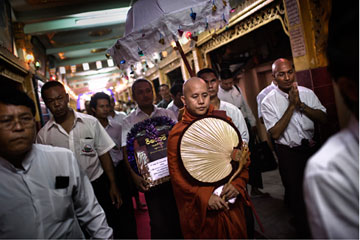
U Wirathu, the spiritual leader of the 969 Buddhist Nationalist movement, and his entourage leave after giving a sermon, at a monastery in Mandalay, Myanmar (Burma) on May 22, 2013. U Wirathu is an abbot in the New Maesoeyin Monastery where he leads about 60 monks and has influence over more than 2,500 residing there. He travels the country giving sermons to religious and laypeople encouraging Buddhists to shun Muslim business and communities.
His face as still and serene as a statue's, the Buddhist monk who has taken the title "the Burmese bin Laden" begins his sermon. Hundreds of worshippers sit before him, palms pressed together, sweat trickling silently down their sticky backs. On cue, the crowd chants with the man in burgundy robes, the mantras drifting through the sultry air of a temple in Mandalay, Burma's second biggest city after Rangoon. It seems a peaceful scene, but Wirathu's message crackles with hate. "Now is not the time for calm," the 46-year-old monk intones, as he spends 90 minutes describing the many ways in which he detests the minority Muslims in this Buddhist-majority land. "Now is the time to rise up, to make your blood boil."
Buddhist blood is boiling in Burma, also known as Myanmar — and plenty of Muslim blood is being spilled. Over the past year, Buddhist mobs have targeted members of the minority faith. The authorities say scores of Muslims have been killed; international human-rights workers put the number in the hundreds. Much of the violence was directed against the Rohingya, a largely stateless Muslim group in Burma's far west that the U.N. calls one of the world's most persecuted people. The communal bloodshed then spread to central Burma, where Wirathu lives and preaches his virulent sermons. The radical monk sees Muslims, who make up at least 5% of Burma's estimated 60 million people, as a threat to the country and its culture. "[Muslims] are breeding so fast and they are stealing our women, raping them," he tells me. "They would like to occupy our country, but I won't let them. We must keep Myanmar Buddhist."
Such hate speech threatens the delicate political ecosystem in a country peopled by at least 135 ethnic groups that has only recently been unshackled from nearly half a century of military rule. Already some government officials are calling for implementation of a ban, rarely enforced during the military era, on Rohingya women's bearing more than two children. And many Christians in the country's north say recent fighting between the Burmese military and ethnic Kachin insurgents, who are mostly Christian, was exacerbated by the religious divides.
Radical Buddhism is also thriving in other parts of Asia. This year in Sri Lanka, Buddhist nationalist groups with links to high-ranking officialdom have gained prominence, and monks have helped orchestrate the destruction of Muslim and Christian property. And in Thailand's deep south, where a Muslim insurgency has claimed some 5,000 lives since 2004, the Thai army trains civilian militias and often accompanies Buddhist monks when they leave their temples to collect alms, as their faith asks of them. The commingling of soldiers and monks — some of whom have armed themselves — only heightens the alienation felt by Thailand's minority Muslims.
Although each nation's history dictates the course radical Buddhism has taken within its borders, growing access to the Internet means that prejudice and rumors are instantly inflamed with each Facebook post or tweet. Violence can easily spill across borders. In June in Malaysia, where hundreds of thousands of Burmese migrants work, several Buddhist Burmese were killed — likely in retribution, Malaysian authorities say, for the deaths of Muslims back in Burma.
In the reckoning of religious extremism — Hindu nationalists, Muslim militants, fundamentalist Christians, ultra-Orthodox Jews — Buddhism has largely escaped trial. To much of the world, it is synonymous with nonviolence and loving kindness, concepts propagated by Siddhartha Gautama, the Buddha, 2,500 years ago. But like adherents of any religion, Buddhists and their holy men are not immune to politics and, on occasion, the lure of sectarian chauvinism.
When Asia rose up against empire and oppression, Buddhist monks, with their moral command and plentiful numbers, led anticolonial movements. Some starved themselves for their cause, their sunken flesh and protruding ribs underlining their sacrifice for the laity. Perhaps most iconic is the image of Thich Quang Duc, a Vietnamese monk sitting in the lotus position, wrapped in flames, as he burned to death in Saigon while protesting the repressive South Vietnamese regime 50 years ago. In 2007, Buddhist monks led a foiled democratic uprising in Burma: images of columns of clerics bearing upturned alms bowls, marching peacefully in protest against the junta, earned sympathy around the world, if not from the soldiers who slaughtered them. But where does social activism end and political militancy begin? Every religion can be twisted into a destructive force poisoned by ideas that are antithetical to its foundations. Now it's Buddhism's turn.
